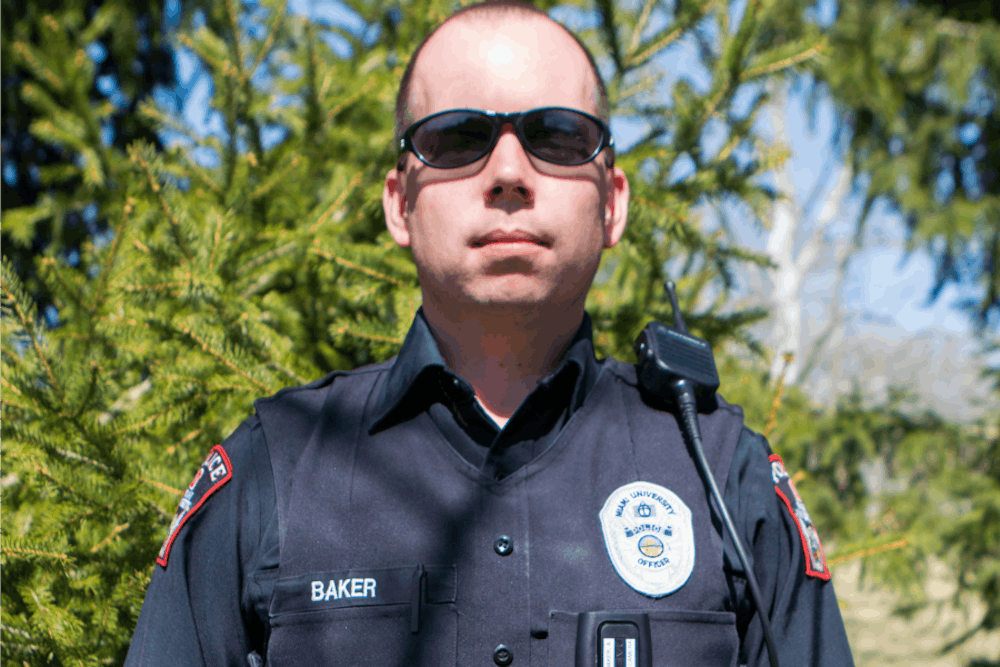MUPD officer Aaron Baker sports one of the new body cameras the department recently purchased.
Photo by Angelo Gelfuso
By Lauren Oliver, The Miami StudentThe Miami University Police Department (MUPD) recently began a new policy of body-worn cameras during their patrols.
Although tension between police officers and civilians across the United States has recently escalated - and there has been a demand for law enforcement to adopt body cameras, the MUPD considered the idea nearly one year ago, finally executing it April 3.
After much deliberation within the organization, MUPD enforced the policy and required officers to be equipped with this new technology.
According to the MUPD policy, "The BWC device is used to record certain activities … thereby creating an unbiased visual and/or audio record of the incident and a supplement to the officer's report."
Miami University Chief of Police John McCandless said he thinks the body cameras will be useful in moderating what could otherwise turn into tricky situations.
"I think that they come in a time where people want transparency, and the cameras help keep everyone on their best behavior - not only citizens, but police offices, as well," he said.
While the body cameras aid in monitoring behavior, they also serve as replacements for the police in-car cameras. The 10 initial car cameras, which have been limited to just one, were outdated at nearly 12 years old, and also cost around $2,000 each - plus an extra fee for installation. However, each body camera costs only around $700.
Although there may have been skepticism regarding the pricing of the body cameras, McCandless said they would save on spending in the long run.
"[The car cameras] were so old that we couldn't fix parts anymore because of the expense involved," McCandless said. "That type of technology doesn't last forever, and when they were purchased so long ago, we got use out of them. [However], I think the body cams will serve us a lot better."
The cameras will not be used throughout the entire day, but rather only during appropriate circumstances. According to policy, such situations include traffic stops, arrests and transports, vehicle searches, physical or verbal confrontations or use of force, OMVI (operating a motor vehicle impaired) investigations, field sobriety tests, as well as several others.
In order to ensure the cameras will not be tampered with, the police officers will plug them in after each day, and then only supervisors will be able to access or edit the visual information. The footage will be stored for up to seven days, and if decided that the video does not need to be retained, it will be deleted.
Junior Jake Harvey said he also sees potential benefits of the body cameras.
"I think it's good, as it'll show the whole story for incidents and not just when someone decides to turn on their phone camera," Harvey said. "If a situation escalates, now we can get the entire backstory of what happened as to how the police officer made their decision."
However, junior Alexis Moten is not so optimistic, as she said they are pointless.
"I find it hard for them to be very effective," Moten said. "I don't see why they need the cameras, especially when I don't see Miami's police presence on campus in the first place."
Moten believes the footage is only from the perspective of the police officer, as they can decide when exactly the cameras are turned on.
McCandless said although people may have their reservations, and the cameras have only been in use for less than two weeks, the MUPD is positive about the future.
"I think they're going to be a good thing for a lot of reasons, and the fact that our officers are excited to have them is good," he said. "We'll wait a few months to get a good idea of whether we've got everything figured out, but for now they seem to be working well."

